

Creative assessments on the BA (Hons) History course. Thursday: Ungrading and Alternative Assessment. Introduction I recently offered a series of "small things you can do tomorrow to start ungrading.
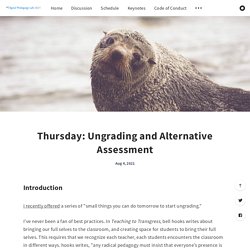
" I’ve never been a fan of best practices. In Teaching to Transgress, bell hooks writes about bringing our full selves to the classroom, and creating space for students to bring their full selves. This requires that we recognize each teacher, each students encounters the classroom in different ways. hooks writes, "any radical pedagogy must insist that everyone’s presence is acknowledged. " The work of learning is idiosyncratic, embodied. (1235) Webinar Online Teaching and Learning for Campus Instructors: Remote Assessment Types & Tools.
...........Experimental Blog: Towards A new Curriculum and Assessment Agency in Scotland. It will be the same picture across the rest of the UK.
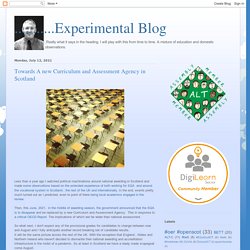
With the exception that England , Wales and Northern Ireland who haven't decided to dismantle their national awarding and accreditation infrastructure in the midst of a pandemic. So at least in Scotland we have a ready made scapegoat come August. It is time to reflect on : what we need from a national awarding body, what we expect of support agencies, funding bodies, audit and inspection organisations. They are all, in one way or another, part of the mix. Academic Practice. Kay Sambell and Sally Brown: Covid-19 Assessment Collection - Sally Brown Sally Brown.
This page collects together the various posts and downloads published on this website since March 2020, about how university assessment may be adjusted and reimagined in the context of the pandemic affecting much of the world.
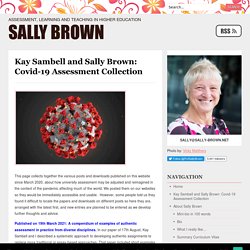
We posted them on our websites so they would be immediately accessible and usable. However, some people told us they found it difficult to locate the papers and downloads on different posts so here they are, arranged with the latest first, and new entries are planned to be entered as we develop further thoughts and advice. Authentic, formative assessment becoming more and more important #ungrading. Opportunities to Provide Authentic, Inclusive and Engaging Digital Assessment - SUMS.
The Last University Process Almost Untouched by Technology Many sectors use technology to create, deliver and grade assessments and examinations.
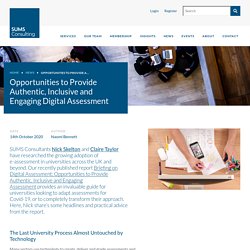
E-assessment software has widely been adopted in language testing, admission exams, school assessment and other areas. This usage dates back 30 years. Assessment and feedback in higher education. We Rise and Fall Together: Assessment during COVID-19. I was invited to keynote a faculty gathering at the University of Pretoria.
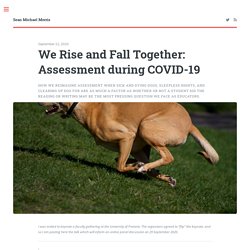
The organisers agreed to “flip” the keynote, and so I am posting here the talk which will inform an online panel discussion on 29 September 2020. “Nobody can be in the world, with the world, and with others in a neutral manner.” ~ Paulo Freire, Pedagogy of Indignation, p. 60. As a preface, let me first thank Salomé Human-Vogel for inviting me to contribute this keynote to the important conversation going on at University of Pretoria. It’s always a pleasure to help open what I hope will be an ongoing, progressive, humanising dialogue.
Let me also say that I started to write a very different piece for this occasion, one that began with an adorably self-assured bit about the issues which make up the question of assessment. In The Politics of Education, Paulo Freire wrote: The theme of an essay is not merely what appears on the surface in words. Attention to accreditation will drive lifelong learning. From providing access to knowledge and skills required by industry, to ensuring a greater diversity in leadership roles, education is a major building block for social mobility.
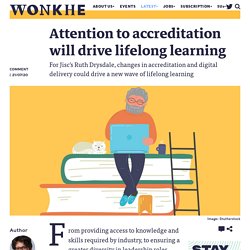
This is something we have known for a long time, but the Covid-19 pandemic has intensified the focus. Reports show that university graduates are facing a challenging post-Coronavirus job market, and as employability is set to remain unstable for some time, access to learning throughout a career span will prove invaluable. The global pandemic has also shone a stark light on the importance of digital connectivity. The digital divide is worsening the educational experience of already disadvantaged learners, and in order for lifelong learning to be delivered sustainably at scale, access to digital technology will be paramount. Rethinking the paradigm As well as ensuring the practical elements of education, there needs to be a mindset shift around learning paths. Improving online delivery. Assessment rebooted report.
Feedback In Lieu of Grades. Best content in covid-19. The future of assessment: five principles, five targets for 2025. Assessment is crucial to the educational process.
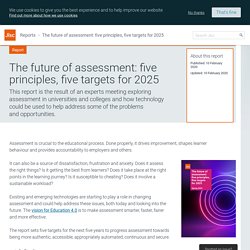
Done properly, it drives improvement, shapes learner behaviour and provides accountability to employers and others. It can also be a source of dissatisfaction, frustration and anxiety. Does it assess the right things? Is it getting the best from learners? Does it take place at the right points in the learning journey? Assessment in the digital age. 4. Schrödinger’s undead cat. (222) Dylan William: What do we Mean by Assessment for Learning? Four things new students need to know before tackling a university assessment. So you’re going to university.
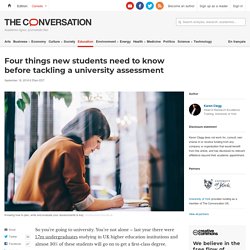
You’re not alone – last year there were 1.7m undergraduates studying in UK higher education institutions and almost 30% of these students will go on to get a first-class degree. The employment market is saturated with graduates with good degrees and qualifications, so it’s important to achieve your full potential to help you stand out from the crowd when you graduate. Glenn Fulcher. This book is designed to introduce teachers and students to the practice of language testing, so that they will be able to design, build, and evaluate their own tests.
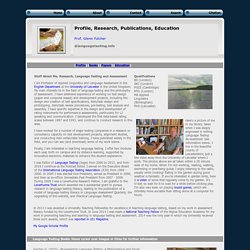
There is a strong focus on classroom assessment, as well as providing an introduction to standardized and standards-based testing. The themes of the book also integrate with material on this website. Twitter. Feedback for Learning – Closing the assessment loop. Intercultural Assessment. Project website coming soon!
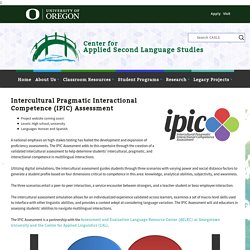
Levels: High school, universityLanguages: Korean and Spanish A national emphasis on high-stakes testing has fueled the development and expansion of proficiency assessments. The IPIC Assessment adds to this repertoire through the creation of a validated intercultural assessment to help determine students’ intercultural, pragmatic, and interactional competence in multilingual interactions.
Utilizing digital simulations, the intercultural assessment guides students through three scenarios with varying power and social distance factors to generate a student profile based on four dimensions critical to competence in this area: knowledge, analytical abilities, subjectivity, and awareness. The three scenarios entail a peer-to-peer interaction, a service encounter between strangers, and a teacher-student or boss-employee interaction.
Stress and serious anxiety: how the new GCSE is affecting mental health. On Monday morning, what may be the most dreaded and feared set of public exams England’s teenagers have ever sat began in school assembly halls up and down the country. It is 30 years since GCSEs (General Certificate for Secondary Education) were first introduced under Margaret Thatcher, replacing O-levels and CSEs. The new exam was designed to cover a broad spectrum of ability rather than dividing pupils between high achievers, who sat O-levels, and lower-ability students, who took CSEs. ''Tis the season for exam anxiety – but we need to remind our pupils that it's completely normal to feel stressed' If I were education secretary, exams would be severely minimised, if not abolished entirely.
You see, exams don’t give an indication of much that matters. They don’t measure intelligence or progress, merely the ability to remember specific, fairly arbitrary information under timed conditions. (I’m saying this as a person who performs well in tests because I have good recall, which is how I managed to salvage the three years of severe and untreated mental health difficulties and self-medicinal inebriation that characterised my time at university and emerge with a decent degree). Until such time as the limitations of exams are more broadly accepted, however, 'tis the season for teachers and pupils alike to be extremely anxious. In recent years, I’ve noticed that academic anxiety has usurped body image concerns and bullying to top young people’s list of mental health-related concerns. 1.
Renewable assignments: Student work adding value to the world. By Christina Hendricks posted on October 29th, 2015 Though faculty might not like to think about them this way, much of the work produced by students in courses at postsecondary institutions ends up being dumped in the trash once it’s marked. David Wiley calls assignments that students just submit to instructors or teaching assistants and that don’t have a life beyond that purpose “disposable assignments”: Digital Exams Enable Fast and Effective Grading Outcomes. Manchester, England, United Kingdom Professor Richard J. Reece, from the University of Manchester, in the United Kingdom, shares his institution’s success with digital exams, which offer students real-world experience and allows faculty the time to provide well-thought-out feedback, among other advantages.
With over 40,000 students and established as a global top 50 institution, the University of Manchester stands as England’s first civic university. In its current form, the institution is the result of a 2004 fusion between the Victoria University of Manchester and the University of Manchester Institute of Science and Technology (UMIST). Constantly looking ahead, the university developed its Virtual Learning Environment (VLE) and started offering students digital exams over a decade ago.
Professor Richard J. Creating Innovative Technology – enhanced Assessments: Systematic Approaches. Assessment isn't about bureaucracy but about teaching and learning (opinion) What is authentic assessment? Designing learning and assessment in a digital age. The Misguided Drive to Measure ‘Learning Outcomes’ In 2006, the Commission on the Future of Higher Education, convened by Margaret Spellings, the secretary of education at the time, issued a scathing critique of universities.
“Employers report repeatedly that many new graduates they hire are not prepared to work, lacking the critical thinking, writing and problem-solving skills needed in today’s workplaces,” the commission’s report complained. The impact of anonymous marking on students’ perceptions of fairness, feedback and relationships with lecturers: Assessment & Evaluation in Higher Education: Vol 0, No 0. ENhance Quick Guides & Resources.
ETS Research: Angoff. EduTechAsia 2016 Continuous assessment vs final examination assessing the impact of new testing strategies. Portfolios, assessment and Mahara - Technology Enhanced Learning. Evaluating and designing learning spaces. The issue. Pearson’s Grand Vision: Standardised Everything! Re-mediating assessment: Traditional Approaches to Validity in Classroom Assessment and Innovative Credentialing (Part 1) By Daniel Hickey. Examining technology enhanced assessment in HE – Post Compulsory Education in a Digital Age. Here's how the method of testing can change student scores. Steve Graham, Arizona State University. Technology-enhanced assessment and feedback in further education and skills – how is the sector doing?
In this post, we explore where you are on the road to technology-enhanced assessment, the barriers you've faced, and our planned activity to help you overcome them. Higher Education Academy EvidenceNet / Technology, Feedback, Action!: Impact of Learning Technology on Students' Engagement with Feedback. Centre for Recording Achievement. 10 key messages - Focus On Using Technology to Support Assessment and Feedback.
Feedback and Assessment Benchmarking Tool. Assessment%20design.pdf. Assessing Student Learning - five practical guides. Languages Initiative sur Twitter : "Looking at item construction, pre-testing recommended, not yet done here @JCforTeachers @PDST_Ireland #RELANGie. #rhizo15 What should we count? Home. Fair measures. Competency-Based Education 2.0. Excellent Qualitative Formative Assessment Toolkit for Teachers. 5 Tips for Providing Student Feedback. Re-assessing innovative assessment. Ipsative Assessment - Gwyneth Hughes - Palgrave Macmillan. Want to help students improve their work? Mark them on their progress.
Comparing esubmission and marking tools. Transforming Assessment. Lmtf-report-3-universal-learning-en.pdf. Visualising Programme Assessments: do you know when assessments are due? Assessment. 23/07/2014 UCML welcomes ALCAB report on new modern languages A levels. Assessment and Learning: State of the field review – OUCEA. Digital Is. Next steps: Implementing e-portfolio assessment. REAP - Resources > Assessment Principles: Some possible candidates. The Assessment Uncertainty Principle. ASKe Manifesto seven years on: so what did change? ASKe Manifesto seven years on: so what did change? Beyond Knowing Facts, How Do We Get to a Deeper Level of Learning? Ropean Association for Language Testing and Assessment. Resources > ECML.Publications. RELANG > Home. Home Page. CEFTrain Project. Two (Optimistic) Predictions for Learning in 2014.
Transforming Assessment and Feedback. University of Leeds OERs. Marking in Perspective: Selective, Formative, Effective, Reflective. What are the advantages and disadvantages of portfolio assessment? Starting with an A. Transforming Assessment and Feedback. Assessment & feedback programme. Graduate School of Education. Badges as currency for teacher professional development. DVD "Spoken performances illustrating the 6 levels of the Common European Framework of Reference for Languages"
Letters: Modern language exam grades translate into poor results. Roger Tilles warns of 'dangerous' overemphasis on education testing. Assessment in open spaces. How To Use Formative Assessment With (And Without) Technology. Digital assignments: How shall we grade them? E-Assessment Association. Growth of online marking 'could improve reliability' SLA research: still in the shackles of traditional grammar? Understanding Grading. People.cs.pitt.edu/~wiebe/pubs/papers/emnlp05polarity.pdf. 157 Group responds positively to Technical Baccalaureate announcement.